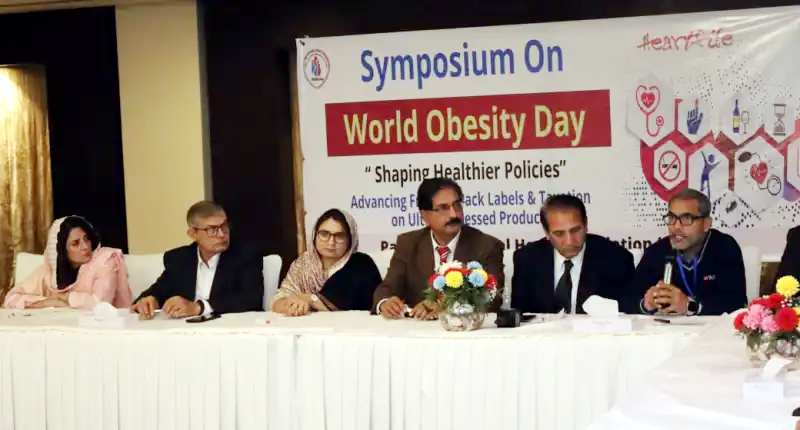
The prevalence of obesity, overweight, and diet-related non-communicable diseases (NCDs) is rising at an alarming rate in Pakistan. More than 40% of the population is either overweight or obese, with childhood overweight rates nearly doubling between 2011 and 2018. Among women of reproductive age, obesity and overweight have surged from 28% to 38% in just five years. A major contributor to this health crisis is the growing consumption of ultra-processed foods high in sugar, salt, and trans fats.
To address this urgent issue, the Pakistan National Heart Association (PANAH) organized a symposium on World Obesity Day in Islamabad, bringing together experts, health professionals, policymakers, civil society representatives, and media. Discussions centered on policies to reduce the consumption of ultra-processed foods, with a strong focus on implementing higher taxes and Front-of-Pack Warning Labels (FOPWLs) on products containing excessive amounts of sugar, salt, fats, or non-sugar sweeteners.
Speakers highlighted that taxing ultra-processed foods presents a “triple win” for the government: it lowers obesity rates and NCD risk factors, generates additional revenue, and requires little to no implementation cost. They urged the Ministry of Finance and the International Monetary Fund (IMF) to prioritize increasing the Federal Excise Duty (FED) on unhealthy foods instead of placing financial burdens on fuel, energy, and salaried citizens. Additionally, they stressed that the revenue from these taxes should be earmarked for public health and nutrition initiatives.
A holistic policy approach was emphasized, including stricter trans fat regulations, marketing restrictions, and the mandatory introduction of FOPWLs on ultra-processed foods. Enacting these measures would empower consumers to make informed, healthier food choices.
Dr. Saba Amjad from Heartfile, in his keynote address, underscored that overweight and obesity are modifiable risk factors for cardiovascular diseases and other life-threatening NCDs. He called for immediate policy interventions, particularly higher taxation on ultra-processed foods and the enforcement of warning labels, to curb their consumption.
PANAH’s Secretary General, Sanaullah Ghumman, provided insights into the organization’s ongoing campaign to reduce ultra-processed food consumption. He emphasized that PANAH is actively raising public awareness while also engaging policymakers to develop evidence-based strategies for curbing obesity and diet-related diseases. He pointed out that while the government is taking steps to stabilize the economy, increasing taxes on sugary drinks and ultra-processed foods is a practical, evidence-backed solution—not only to reduce disease burden but also to generate substantial national revenue.
Other speakers echoed the urgent need for decisive action to address Pakistan’s growing NCD crisis. They stressed the importance of transparent, integrity-driven policymaking that prioritizes public health over corporate interests. Civil society leaders called on the government to place public health at the forefront of decision-making and ensure that policies remain free from industry influence.
